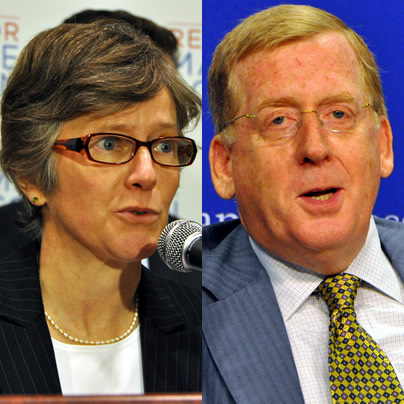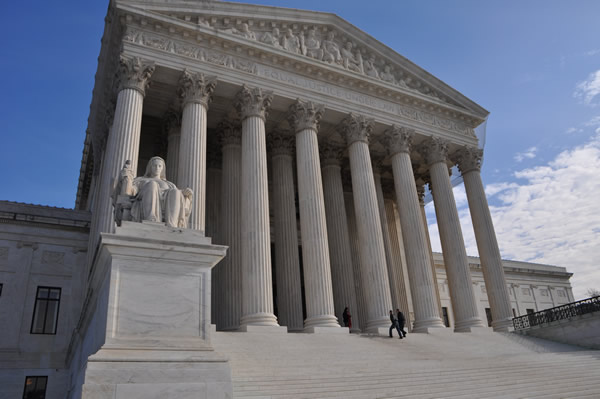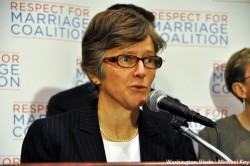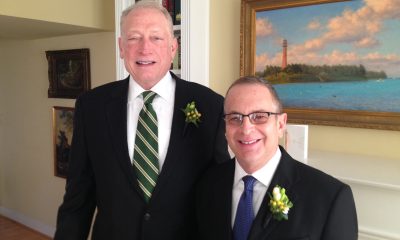Politics
10 years later, another Supreme wait
Attorneys for landmark gay rights cases compare their significance to pending lawsuits


The U.S. Supreme Court (Washington Blade file photo by Michael Key)
Expectations are high as the wait continues for two decisions expected in June on marriage cases before the U.S. Supreme Court, just as they were 10 years ago when gay rights supporters awaited what amounted to landmark rulings in two other cases.
In 2003, two cases reshaped the landscape for gay rights: the U.S. Supreme Court decision in Lawrence v. Texas, which struck down state sodomy laws throughout the country, and the Massachusetts Supreme Court decision in Goodridge v. Department of Public Health, which for the first time led to the legalization of marriage equality in a U.S. jurisdiction.
The two cases currently before the court — Hollingsworth v. Perry, which aims to strike down California’s Proposition 8, and United States v. Windsor, which is challenging the Defense of Marriage Act — are different in many respects from the cases 10 years ago. Lawrence was related to sodomy laws and Goodridge was a state lawsuit that resulted in a change only in Massachusetts. Still, they’re similar in terms of their potential significance.
The two attorneys who made arguments before the courts in the decades-old lawsuits — in the Goodridge case, Mary Bonauto, civil rights director for Gay & Lesbian Advocates & Defenders, and, in the Lawrence case, Paul Smith, a partner at Jenner & Block — acknowledged the magnitude of the cases both then and now, but said it’s hard to compare the significance of the older ones to the newer ones.
Smith said we won’t know the significance of the DOMA and Prop 8 cases until the Supreme Court rules on them, but touted the Lawrence decision striking down sodomy bans across the country as significant in any event.
“It provided the foundation for all the progress that has been made on marriage and other forms of discrimination over the past 10 years,” Smith said. “It did that by establishing that our relationships are just as important and valuable as different-sex relationships and by saying that the government can’t use morality as a justification for interfering with individual choices about who to love and how. With those principles in place it’s very hard for anyone to come up with a legitimate and persuasive justification for discrimination based on sexual orientation.”
Similarly, Bonauto said “it’s not really easy” to compare the significance of the Goodridge case to the Perry and Windsor lawsuits, recalling the different cultural climate 10 years ago in which the Massachusetts case was argued.
“In 2003, these waters were largely uncharted,” Bonauto said. “There were zero marriage states, a civil union system in Vermont, and 36 states with discriminatory statutes and four states with amendments. But then, as now, we were right; right on the constitutional principles and the utter absence of legal justifications for this discrimination.”
Those court rulings — in particular the Goodridge decision because it was the first successful case for full marriage equality in the United States — paved the way for 11 more states to approve same-sex marriage over the course of 10 years, including the legalization of marriage equality in Minnesota just this week.
Just as observers are parsing statements from justices now in an attempt to determine what the court may rule on Prop 8 and DOMA, followers of the court cases a decade ago were also trying to predict the future based on what was said during oral arguments.
In Lawrence, Smith said moderate justices at the time — Associate Justice Anthony Kennedy and then-Associate Justice Sandra Day O’Connor — were “uncharacteristically quiet,” making it difficult to predict how the court would rule.
“But we took hope from the fact that they didn’t say anything negative,” Smith added. “We were relatively optimistic that the court would strike down the sodomy laws once the court decided to take the case.”
For Goodridge, Bonauto said the wait was different from now in two regards: first because same-sex marriage wasn’t legalized anywhere in the country at the time, and second because there was no set timeline for when the Massachusetts Supreme Court had to make a decision.
“We thought and hoped we were right on the timing,” Bonauto said. “There were a lot of nerves and uncertainty while we waited. The fact that we didn’t know when the decision would come — no clue at all — added to the nerves and fueled the rumor factory. In the end, the decision turned out to be beautifully written and world-changing.”
In the present, many observers believe that the Supreme Court will issue a decision that will strike down DOMA on its merits — either based on equal protection or federalism grounds — although issues of standing were examined.
For Prop 8, much attention has been given to justices’ interest in the standing of Prop 8 proponents to defend the measure in court. A determination that they lack standing would leave in place a lower court ruling and likely invalidate the ban on same-sex marriage in California.
The standing issues before the Supreme Court, as Bonauto noted, also means the wait for Goodrige was different because the Massachusetts Supreme Court couldn’t rule on this basis.
“There were no outs,” Bonauto said. “They had to decide whether denying marriage to gay couples violates the Constitution of the Commonwealth or not. And I was asked very specifically in oral arguments about Vermont civil unions and a remedy that would provide those protections, and I said, ‘That was not what the plaintiffs were seeking; they were seeking access to marriage itself.'”
Notably, the oral arguments in Lawrence v. Texas took place on March 26, 2003, which is exactly 10 years to the day that oral arguments took place in the Prop 8 case on March 26, 2013. A ruling was issued in the Lawrence case on June 26, 2003 just as a ruling is expected in the Prop 8 and DOMA cases in June 2013.
In the Goodridge case, oral arguments took place before the Massachusetts Supreme Court on March 3, 2003, but a decision wasn’t rendered until Nov. 18, 2003.

Mary Bonauto (Washington Blade photo by Michael Key)
It remains to be seen whether the wording of rulings from the Supreme Court will have the same power as the language that justices handed down a decade ago. The 4-3 ruling in the Goodridge case affirmed that same-sex couples had the right to marry with never before seen language.
“The question before us is whether, consistent with the Massachusetts Constitution, the Commonwealth may deny the protections, benefits, and obligations conferred by civil marriage to two individuals of the same sex who wish to marry,” the decision states. “We conclude that it may not. The Massachusetts Constitution affirms the dignity and equality of all individuals.”
In the Lawrence case, the 6-3 opinion written by Associate Justice Anthony Kennedy determined that the framers intended language in the U.S. Constitution to be reinterpreted by later generations in accordance with their vision of liberty.
“They knew times can blind us to certain truths and later generations can see that laws once thought necessary and proper in fact serve only to oppress,” Kennedy wrote “As the Constitution endures, persons in every generation can invoke its principles in their own search for greater freedom.”
Also unknown is how the public might react if the Supreme Court issues affirmative rulings for marriage equality in the Prop 8 and DOMA cases.
In 2003, the court ruling in Massachusetts — combined with then-San Francisco Mayor Gavin Newsom’s decision to issue marriage licenses to gay couples — sparked a national backlash that led in the next year to 11 states passing constitutional amendments banning same-sex marriage. Former President George W. Bush ran a successful re-election campaign in which he advocated for passage of a Federal Marriage Amendment.
But Bonauto was skeptical that the legalization of same-sex marriage led to the passage of state constitutional amendments and Bush’s re-election — saying the religious right wanted to enact the amendments anyway and analysis shows the marriage issue wasn’t as much a boon to Bush as it may seem on its face.
“By the time we had filed Goodridge, there were already 36 state statutes and four amendments,” Bonauto said. “So, for a lot of these states, they didn’t have anything else to do but to pass an amendment because they already had statutes barring marriage. So I really view this as political opportunism both with elected officials and also the organized right-wing. It was trying to cut us off and change the facts on the ground, so that they could isolate this debate and isolate this issue in certain states.”
Given the growing acceptance of marriage equality — one widely noted recent poll shows it enjoys support from 58 percent of the American public, compared to 30 percent support in 2003 — the negative reaction to any pro-gay rulings will likely be more restrained.
In the event the Supreme Court in June renders similarly favorable decisions in support of rights for gay couples, Bonauto predicted some would speak out in opposition, but the reaction generally would be favorable.
“There are going to be people who are going to say things, and some of them have echo chambers and bully pulpits and their blogs,” Bonauto said. “I don’t think we should equate that to a backlash. I just think that is what public discourse is like in 2013. I really believe that the overwhelming majority of Americans are at a point where they accept and embrace the freedom to marry for same-sex couples.”
Politics
After Biden signs TikTok ban its CEO vows federal court battle
“Rest assured, we aren’t going anywhere,” CEO said

President Joe Biden signed an appropriations bill into law on Wednesday that provides multi-billion dollar funding and military aid for Ukraine, Israel, and Taiwan after months of delay and Congressional infighting.
A separate bill Biden signed within the aid package contained a bipartisan provision that will ban the popular social media app TikTok from the United States if its Chinese parent company ByteDance does not sell off the American subsidiary.
Reacting, TikTok CEO Shou Zi Chew said Wednesday that the Culver City, Calif.-based company would go to court to try to remain online in the United States.
In a video posted on the company’s social media accounts, Chew denounced the potential ban: “Make no mistake, this is a ban, a ban of TikTok and a ban on you and your voice,” Chew said. “Rest assured, we aren’t going anywhere. We are confident and we will keep fighting for your rights in the courts. The facts and the Constitution are on our side, and we expect to prevail,” he added.
Our response to the TikTok Ban Bill in the US: https://t.co/LpoE67sxHo
— TikTokComms (@TikTokComms) April 24, 2024
White House Press Secretary Karine Jean-Pierre adamantly denied during a press briefing on Wednesday that the bill constitutes a ban, reiterating the administration’s hope that TikTok will be purchased by a third-party buyer and referencing media reports about the many firms that are interested.
Chew has repeatedly testified in both the House and Senate regarding ByteDance’s ability to mine personal data of its 170 million plus American subscribers, maintaining that user data is secure and not shared with either ByteDance nor agencies of the Chinese government. The testimony failed to assuage lawmakers’ doubts.
In an email, the former chair of the House Intelligence Committee, California Democratic Congressman Adam Schiff, who doesn’t support a blanket ban of the app, told the Blade:
“As the former chairman of the House Intelligence Committee, I have long worked to safeguard Americans’ freedoms and security both at home and abroad. The Chinese Communist Party’s ability to exploit private user data and to manipulate public opinion through TikTok present serious national security concerns. For that reason, I believe that divestiture presents the best option to preserve access to the platform, while ameliorating these risks. I do not support a ban on TikTok while there are other less restrictive means available, and this legislation will give the administration the leverage and authority to require divestiture.”
A spokesperson for California U.S. Senator Alex Padilla told the Blade: “Senator Padilla believes we can support speech and creativity while also protecting data privacy and security. TikTok’s relationship to the Chinese Communist Party poses significant data privacy concerns. He will continue working with the Biden-Harris administration and his colleagues in Congress to safeguard Americans’ data privacy and foster continued innovation.”
The law, which gives ByteDance 270 days to divest TikTok’s U.S. assets, expires with a January 19, 2025 deadline for a sale. The date is one day before President Biden’s term is set to expire, although he could extend the deadline by three months if he determines ByteDance is making progress or the transaction faces uncertainty in a federal court.
Former President Donald Trump’s executive order in 2020, which sought to to ban TikTok and Chinese-owned WeChat, a unit of Beijing, China-based Tencent, in the U.S., was blocked by federal courts.
TikTok has previously fought efforts to ban its widely popular app by the State of Montana last year, in a case that saw a U.S. District Court judge in Helena block that state ban, citing free-speech grounds.
The South China Morning Post reported this week that the four-year battle over TikTok is a significant front in a war over the internet and technology between Washington and Beijing. Last week, Apple said China had ordered it to remove Meta Platforms’ WhatsApp and Threads from its App Store in China over Chinese national security concerns.
A spokesperson for the ACLU told the Blade in a statement that “banning or requiring divestiture of TikTok would set an alarming global precedent for excessive government control over social media platforms.”
LGBTQ+ TikToker users are alarmed, fearing that a ban will represent the disruption of networks of support and activism. However, queer social media influencers who operate on multiple platforms expressed some doubts as to long term impact.
Los Angeles Blade contributor Chris Stanley told the Blade:
“It might affect us slightly, because TikTok is so easy to go viral on. Which obviously means more brand deals, etc. However they also suppress and shadow ban LGBTQ+ creators frequently. But we will definitely be focusing our energy more on other platforms with this uncertainty going forward. Lucky for us, we aren’t one trick ponies and have multiple other platforms built.”
Brooklyn, New York-based Gay social media creator and influencer Artem Bezrukavenko told the Blade:
“For smart creators it won’t because they have multiple platforms. For people who put all their livelihood yes. Like people who do livestreams,” he said adding: “Personally I’m happy it gets banned or American company will own it so they will be less homophobic to us.”
TikTok’s LGBTQ+ following has generally positive experiences although there have been widely reported instances of users, notably transgender users, seemingly targeted by the platform’s algorithms and having their accounts banned or repeatedly suspended.
Of greater concern is the staggering rise in anti-LGBTQ+ violence and threats on the platform prompting LGBTQ+ advocacy group GLAAD, in its annual Social Media Safety Index, to give TikTok a failing score on LGBTQ+ safety.
Additional reporting by Christopher Kane
Politics
Smithsonian staff concerned about future of LGBTQ programming amid GOP scrutiny
Secretary Lonnie Bunch says ‘LGBTQ+ content is welcome’

Staff at the Smithsonian Institution are concerned about the future of LGBTQ programming as several events featuring a drag performer were cancelled or postponed following scrutiny by House Republicans, according to emails reviewed by the Washington Post.
In December, Secretary Lonnie G. Bunch III appeared before a hearing led by GOP members of the Committee on House Administration, who flagged concerns about the Smithsonian’s involvement in “the Left’s indoctrination of our children.”
Under questioning from U.S. Rep. Stephanie Bice (R-Okla.), Bunch said he was “surprised” to learn the Smithsonian had hosted six drag events over the past three years, telling the lawmakers “It’s not appropriate to expose children” to these performances.
Collaborations with drag artist Pattie Gonia in December, January, and March were subsequently postponed or cancelled, the Post reported on Saturday, adding that a Smithsonian spokesperson blamed “budgetary constraints and other resource issues” and the museums are still developing programming for Pride month in June.
“I, along with all senior leaders, take seriously the concerns expressed by staff and will continue to do so,” Bunch said in a statement to the paper. “As we have reiterated, LGBTQ+ content is welcome at the Smithsonian.”
The secretary sent an email on Friday expressing plans to meet with leaders of the Smithsonian Pride Alliance, one of the two groups that detailed their concerns to him following December’s hearing.
Bunch told the Pride Alliance in January that with his response to Bice’s question, his intention was to “immediately stress that the Smithsonian does not expose children to inappropriate content.”
“A hearing setting does not give you ample time to expand,” he said, adding that with more time he would have spoken “more broadly about the merits and goals of our programming and content development and how we equip parents to make choices about what content their children experience.”
Politics
Survey finds support for Biden among LGBTQ adults persists despite misgivings
Data for Progress previewed the results exclusively with the Blade

A new survey by Data for Progress found LGBTQ adults overwhelmingly favor President Joe Biden and Democrats over his 2024 rival former President Donald Trump and Republicans, but responses to other questions may signal potential headwinds for Biden’s reelection campaign.
The organization shared the findings of its poll, which included 873 respondents from across the country including an oversample of transgender adults, exclusively with the Washington Blade on Thursday.
Despite the clear margin of support for the president, with only 22 percent of respondents reporting that they have a very favorable or somewhat favorable opinion of Trump, answers were more mixed when it came to assessments of Biden’s performance over the past four years and his party’s record of protecting queer and trans Americans.
Forty-five percent of respondents said the Biden-Harris administration has performed better than they expected, while 47 percent said the administration’s record has been worse than they anticipated. A greater margin of trans adults in the survey — 52 vs. 37 percent — said their expectations were not met.
Seventy precent of all LGBTQ respondents and 81 percent of those who identify as trans said the Democratic Party should be doing more for queer and trans folks, while just 24 percent of all survey participants and 17 percent of trans participants agreed the party is already doing enough.
With respect to the issues respondents care about the most when deciding between the candidates on their ballots, LGBTQ issues were second only to the economy, eclipsing other considerations like abortion and threats to democracy.
These answers may reflect heightened fear and anxiety among LGBTQ adults as a consequence of the dramatic uptick over the past few years in rhetorical, legislative, and violent bias-motivated attacks against the community, especially targeting queer and trans folks.
The survey found that while LGBTQ adults are highly motivated to vote in November, there are signs of ennui. For example, enthusiasm was substantially lower among those aged 18 to 24 and 25 to 39 compared with adults 40 and older. And a plurality of younger LGBTQ respondents said they believe that neither of the country’s two major political parties care about them.




















